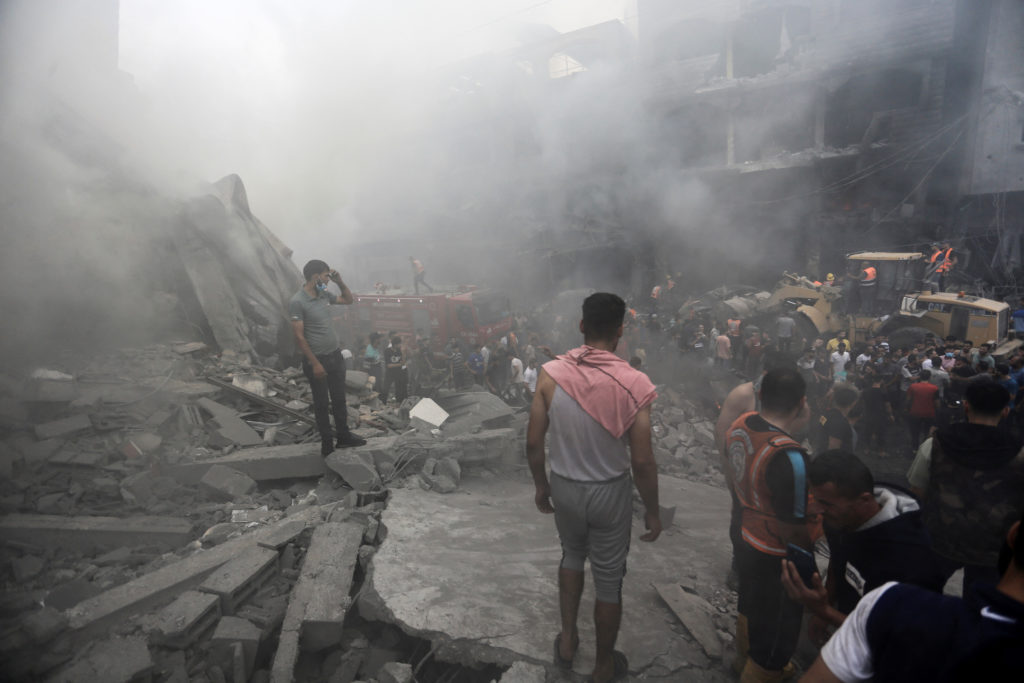Thousands of families are attempting to flee Gaza City as the Israeli military confirms it has begun ground operations that are part of its large-scale assault aimed at occupying the city.
Lina al-Maghrebi, 32, a mother of three from the city's Sheikh Radwan neighbourhood, recounted how she resisted leaving her home until she received a phone call from an Israeli officer ordering her to evacuate. I was forced to sell my jewellery to cover the cost of displacement and a tent, she said. It took us 10 hours to reach Khan Younis, and we paid 3,500 shekels (£735) for the ride. The line of cars and trucks seemed endless.
Israeli Prime Minister Benjamin Netanyahu stated that a powerful operation has been launched in Gaza City, which he described as Hamas's last major stronghold.
The Israeli military has designated al-Rashid coastal road as the only permitted route for civilians to use to evacuate. Many have described severe congestion, endless queues, and delays, with families stranded while airstrikes continue overhead.
This operation has drawn widespread international condemnation, including remarks from the UN human rights chief and German foreign minister, with UK Foreign Secretary Yvette Cooper calling it utterly reckless and appalling.
However, US Secretary of State Marco Rubio showed tacit support for Israel's actions, saying during a joint press conference with Netanyahu that, sometimes when you're dealing with a group of savages like Hamas, that's not possible.
The Israeli offensive comes amid a UN commission's report alleging that Israel is committing genocide against Palestinians, a claim that Israel has rejected.
Residents have described the overnight airstrikes as hell; Ghazi al-Aloul, a displaced resident, told the BBC he now sleeps at the entrance of al-Quds Hospital, forced out from his home in northern Gaza. The bombardment has been insane for hours, he said, relaying fears of army threats to demolish residential buildings in the area.
Many families like Nivin Imad al-Din’s are forced to leave everything behind, unable to rent vehicles due to the exorbitant costs. The costs of displacement have surged; a small truck rental is around 3,000 shekels (£630), while tents are approximately 4,000 shekels (£840). Reports indicate that an intense wave of bombardments across Gaza has occurred, with heavy shelling and air force deployment drastically increasing.
Sami Abu Dalal, describing his nights of terror under bombardment, reported that whole blocks were leveled, leaving many dead or missing. The situation in Gaza City continues to dramatically escalate, revealing a harrowing reality for those trying to escape the violence.
Lina al-Maghrebi, 32, a mother of three from the city's Sheikh Radwan neighbourhood, recounted how she resisted leaving her home until she received a phone call from an Israeli officer ordering her to evacuate. I was forced to sell my jewellery to cover the cost of displacement and a tent, she said. It took us 10 hours to reach Khan Younis, and we paid 3,500 shekels (£735) for the ride. The line of cars and trucks seemed endless.
Israeli Prime Minister Benjamin Netanyahu stated that a powerful operation has been launched in Gaza City, which he described as Hamas's last major stronghold.
The Israeli military has designated al-Rashid coastal road as the only permitted route for civilians to use to evacuate. Many have described severe congestion, endless queues, and delays, with families stranded while airstrikes continue overhead.
This operation has drawn widespread international condemnation, including remarks from the UN human rights chief and German foreign minister, with UK Foreign Secretary Yvette Cooper calling it utterly reckless and appalling.
However, US Secretary of State Marco Rubio showed tacit support for Israel's actions, saying during a joint press conference with Netanyahu that, sometimes when you're dealing with a group of savages like Hamas, that's not possible.
The Israeli offensive comes amid a UN commission's report alleging that Israel is committing genocide against Palestinians, a claim that Israel has rejected.
Residents have described the overnight airstrikes as hell; Ghazi al-Aloul, a displaced resident, told the BBC he now sleeps at the entrance of al-Quds Hospital, forced out from his home in northern Gaza. The bombardment has been insane for hours, he said, relaying fears of army threats to demolish residential buildings in the area.
Many families like Nivin Imad al-Din’s are forced to leave everything behind, unable to rent vehicles due to the exorbitant costs. The costs of displacement have surged; a small truck rental is around 3,000 shekels (£630), while tents are approximately 4,000 shekels (£840). Reports indicate that an intense wave of bombardments across Gaza has occurred, with heavy shelling and air force deployment drastically increasing.
Sami Abu Dalal, describing his nights of terror under bombardment, reported that whole blocks were leveled, leaving many dead or missing. The situation in Gaza City continues to dramatically escalate, revealing a harrowing reality for those trying to escape the violence.

















